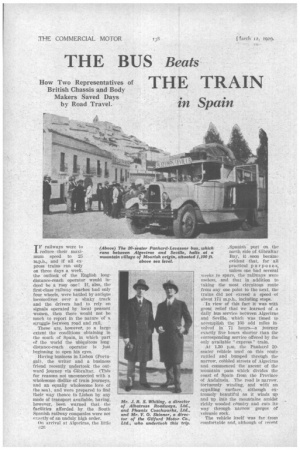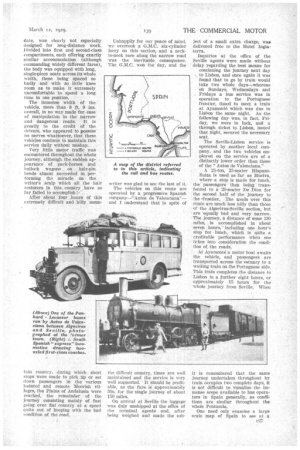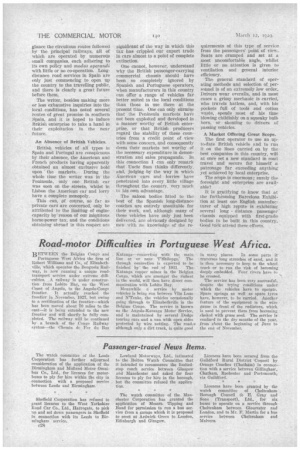THE BUS Beats
Page 56

Page 57

Page 58

If you've noticed an error in this article please click here to report it so we can fix it.
THE TRAIN
in Spain
IF railways were to reduce their maximum speed to 25 m.p.h., anti if all express trains ran only on three days a week, the outlook of the English longdistance-coach operator would indeed be a rosy one! If, also, the first-class railway coaches had only four wheels, were hauled by antique locomotives over a shaky track and the drivers had to 'rely on signals operated by local peasant women, then there would not he much to report in the nature of a struggle between road and rail.
These-. are, however, to a large extent the conditions obtaining in the south of Spain, in which part of the world the ubiquitous longdistance-coach operator is just beginning to open his eyes.
Having business in Lisbon (Portugal), the writer and a business friend recently undertook the outward journey via Gibraltar. (This for reasons not unconnected with a wholesome dislike of train journeys, and an equally wholesome lore of the sea), and were prepared to find their way thence to Lisbon by any mode of transport available, having, however, been warned that the facilities afforded by the South Spanish railway companies were not exactly of an unduly high order.
On arrival at Algeciras, the little c26
,Spanish port on the north side of Gibraltar Bay, it --soon became evident that, for ' all practical purpose
unless one had several weeks to spare, the railways were nseless, _ and that in . addition to • taking the most circuitous route from any one point to the next, the trains did not exceeda speed of about 174 m.p.h., including stops.
in view of this fact it was with great relief that we learned of a daily bus service between Algeciras and Seville, which was timed to accomplish the 160 odd miles in volved in 7i hours—a journey exactly 'five hours shorter than the corresponding service offered by the only available " express " train.
At 1.30 p.m. the Panhard 20. seater vehicle used on this route rattled and humped through the narrow, cobbled streets of Algeciras and commenced the ascent of the mountain pass which divides the coast of Spain from the Province of Andalusia. The road is narrow, tortuously winding, and with' an appalling surface, although extremely beautiful as it winds up and up into the mountains amidst richly wooded country and cuts its • way through narrow gorges of volcanic rock.
The vehicle itself was far from comfortable and, although of recent date, was clearly not especially designed for long-distance work.
Divided into first and second-class compartments, each offering exactly similar accommodation (although commanding widely different fares), the body was equipped with long, single-piece seats across its whole width, these being spaced so badly and with so little knee room as to make it extremely uncomfortable to spend a long time in one position.
The immense width of the vehicle, more than 8 ft. 9 ins. overall, in no way made for ease of manipulation in the narrow and dangerous roads. It is greatly to the credit of the drivers, who appeared• to possess no nerves whatsoever, that these vehicles continue to maintain this service daily without mishap.
Very .little motor traffic was encountered throughout the whole journey, although the, sudden appearance.. of pack-horses and bullock wagons on hair-pin Fends almost succeeded in performing . the miracle on the writer's sealp which all the hair restorers in this . country have so far failed to accomplish ! After :about_ four hours of this extremely difficult and hilly moun tam country, during which short stops were made to pick up or set down passengers in the various isolated and remote Moorish villages, the Plains of Andalusia were reached, the remainder of the journey consisting mainly of fast going. over flat country at a speed quite out: of keeping with the bad condition of the road. ..
• Unhappily for our peace of mind, • we overtook a G.M.C. six-cylinder lorry on this section, and a neckto-neck race along the narrow road was the inevitable consequence. The •G.M.C. won the day, and the writer was glad to see the last of it.
The vehicles on this route are operated by a . progressive. Spanish company-"Autos de Valenciana"-and I understand that in spite of
the difficult country, times are well maintained and the service is .very well supported; It shotild be fif0fl1able, as the fare is approximately 30s. for the single journey of about 150 miles.
On arrival at Seville the luggage was duly unshipped at the office of the terminal agents and, after being weighed and made the sub
ject of a small extra charge, was delivered free to the Hotel Inglaterra.
Inquiries at the office of the Seville agents were made without delay regarding the best means for continuing the journey next day to Lisbon, and once again it was found that to go by train would take two whole days—whereas on Sundays, Wednesdays and . Fridays a bus service was in Operation to the Portuguese frontier, timed to meet a train
at ilyamonte which was due in Lisbon the same night. As the
following day was, in fact, Friday, we were in luck, and a through ticket to Lisbon, issued that night, secured the necessary seat. , The Seville-Lisbon service is operated by another local com pany, and the two vehicles employed on the service are of a distinctly lower order than those of the " Autos de Valenciana."
A 2i-ton, 25-seater Hispano • Suiza is used as far as Huelva, where a stop is made for lunch, the passengers then being transferred to a 20-seater De Dion for the second half of the journey to the 'frontier. The rkads over this route are much less hilly than those of the Algeciras-Seville section, but : are 'equally bad and very narrow. The journey, a distance of some 130 miles, is accomplished in about seven hours, including one hour's stop for lunch, which is quite a creditable performance when one • takes into consideration the condition ot the roads.
At Ayamonte a motor boat awaits the vehicle, and passengers are transported across the estuary to a waiting train on the Portuguese side. This train completes the distance to Lisbon in a further eight hours, or approximately 15 hours for the whole journey from Seville. When it is remembered that the same journey undertaken throughout by train occupies two complete days, it is not difficult to visualize the immense scope available to bus operators in Spain generally, as conditions are similar throughout the whole Peninsula.
One need only examine a large scale map of Spain to see at a c27
glance the circuitous routes followed by the principal railways, all of which are operated by numerous small companies, each adhering to its own policy and modus operandi with little or no co-operation. Longdistance road services in Spain are only just commencing to open up the country to the travelling public, and there is clearly a great future before them.
The writer, besides making more or less exhaustive inquiries into the local conditions, has noted several routes of great promise in southern Spain, and it is hoped to induce British enterprise to take a hand in their exploitation in the near future.
An Absence of British Vehicles.
British vehicles of all types hi Spain and Portugal are conspicuous by their absence, the American and French products having apparently obtained an almost exclusive hold upon the markets... During the whole time the writer was in the Peninsula, only one British car was seen on the streets, whilst in Lisbon the American car and lorry have a complete monopoly.
This can, of coin-se, so far as private cars are concerned, only be attributed to the limiting of engine capacity by 'reason of our iniquitous horse-power -tax, and the conditions Obtaining abroad in this respect are significant of the way in which this tax has crippled our export trade in cars almost to a point of complete extinction.
One cannot, however, understand why the British passenger-carrying commercial chassis should have been so completely ignored by Spanish and Portuguese operators, when manufacturers in this country can offer a range of vehicles far better suited to the local conditions than those in use there at the present time. One can only surmise that the Peninsula markets have not been exploited and developed in a Manner worthy of British enterprise, or that British producers regard the stability of these countries from a credit point of view with some concern, and consequently deem their markets not worthy of the necessary expenditure in demonstration and sales propaganda. in this connection I can only remark that. Uncle Sam thinks differently, and, judging .by the way in which American cars and lorries have penetrated into every little village throughout the country, "very much to his own advantage.
The saloon bodies fitted to the best of the Spanish long-distance coaches are entirely unsuitable for their work, and, although many of these vehicles have only just been delivered, are obviously designed by men with no knowledge of the re
quirements of this type of service from the passengers' point of view. Seats are cramped and set at a most uncomfortable angle, whilst little or no attention is given to ventilation and general interior efficiency.
The general standard of operating methods and selection of personnel is of an extremely low order. Drivers wear overalls, and in most cases a grimy mechanic is carried, who travels hatless, and, with his pockets full of tools and cotton waste, spends most of his time blowing childishly on a squeaky bulb born, or shouting to drivers a passing vehicles.
A Market Offering Great Scope.
The first operator to use an unto-date British vehicle and to run it on the lines carried on by the best companies in this country, will at once set a new standard in road travel and secure for himself a patronage far exceeding anything yet achieved by local enterprise. . .
The sc4Ipe. is enormous ; surely the foresight and enterprise are available?
it is gratifying to know that at the forthcoming Barcelona Exhibition at 'least one English manufacturer of high 'repute IS exhibiting severallong distance passenger' chassis equipped with first-grade bodies to he built in this country.
Good hiCk attend these efforts. "




























































































































